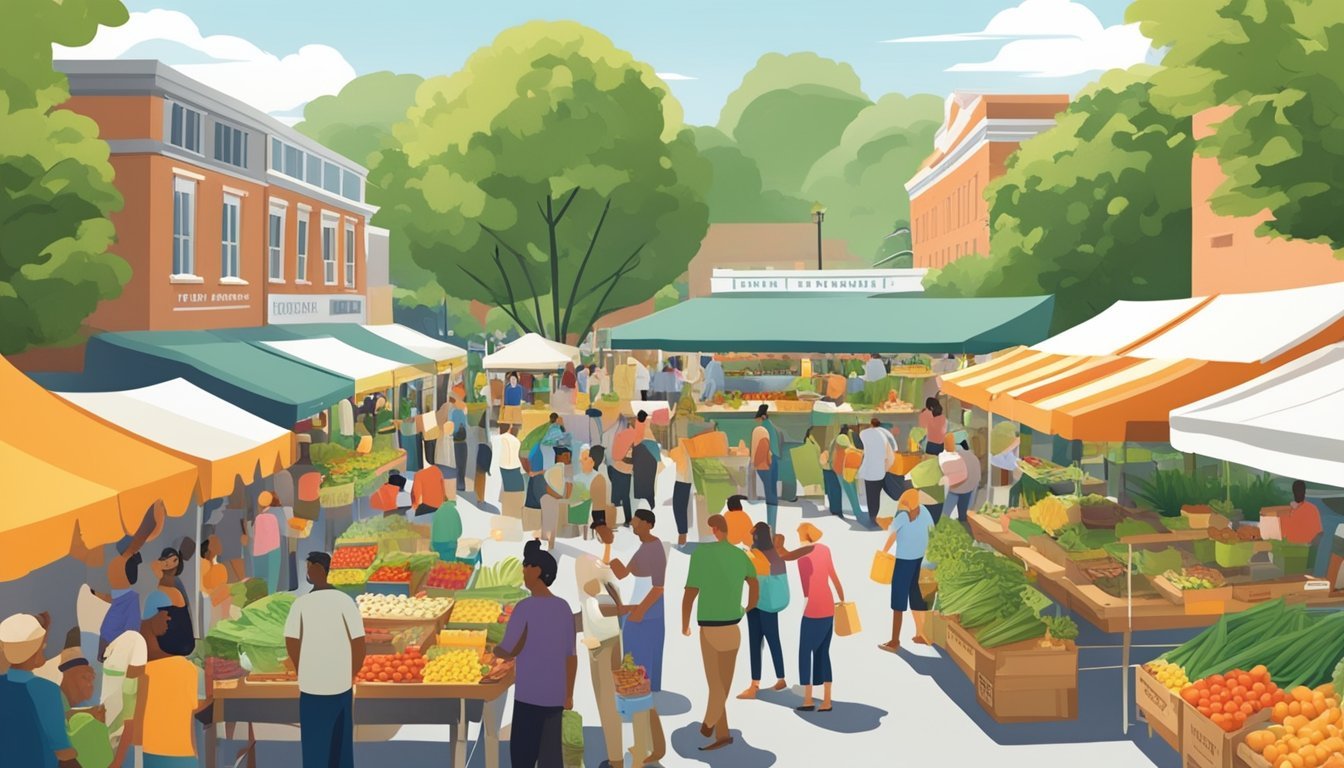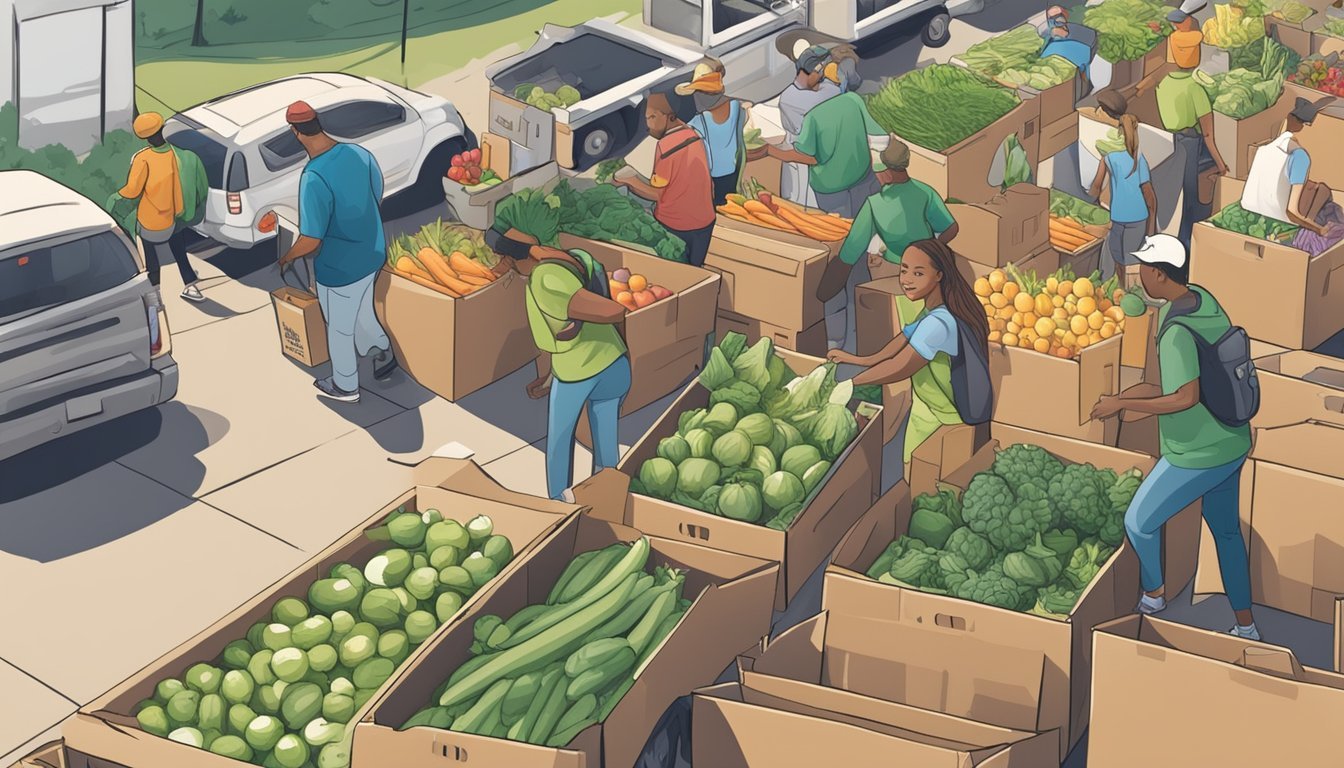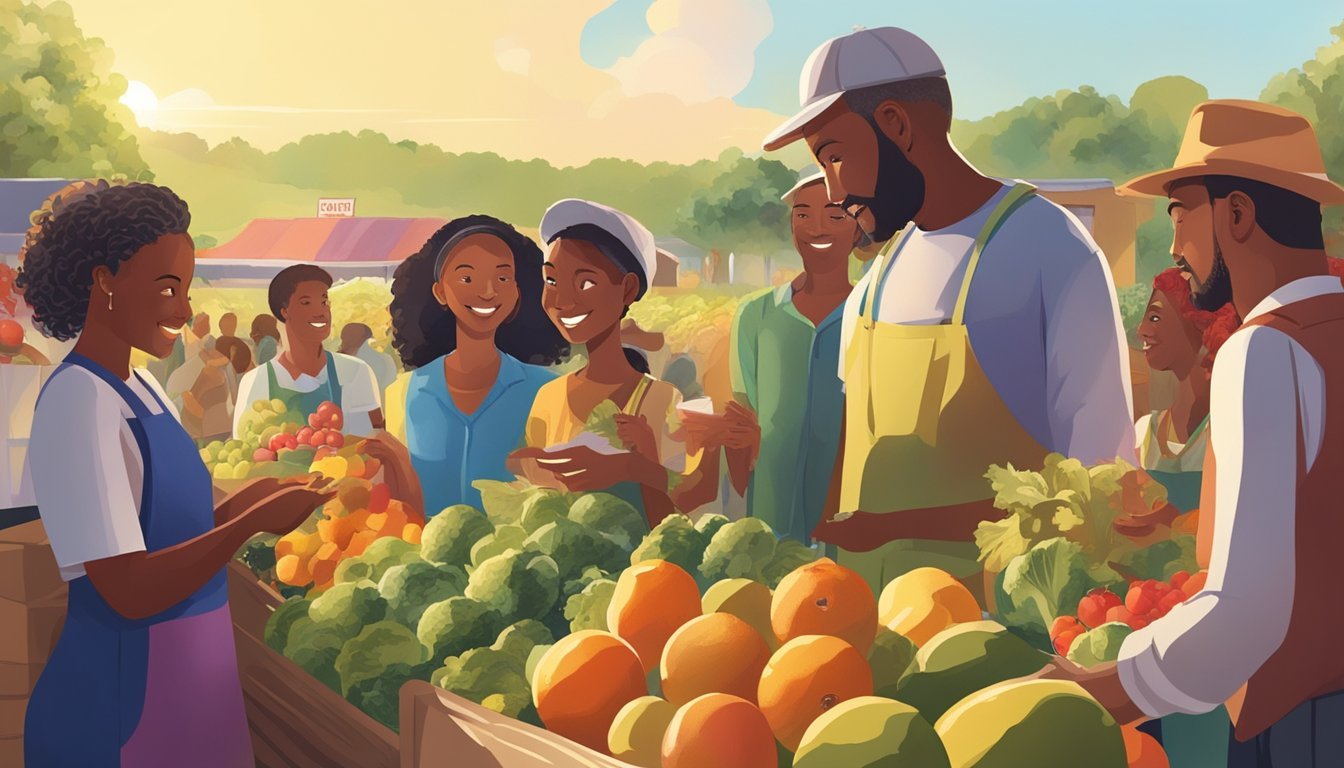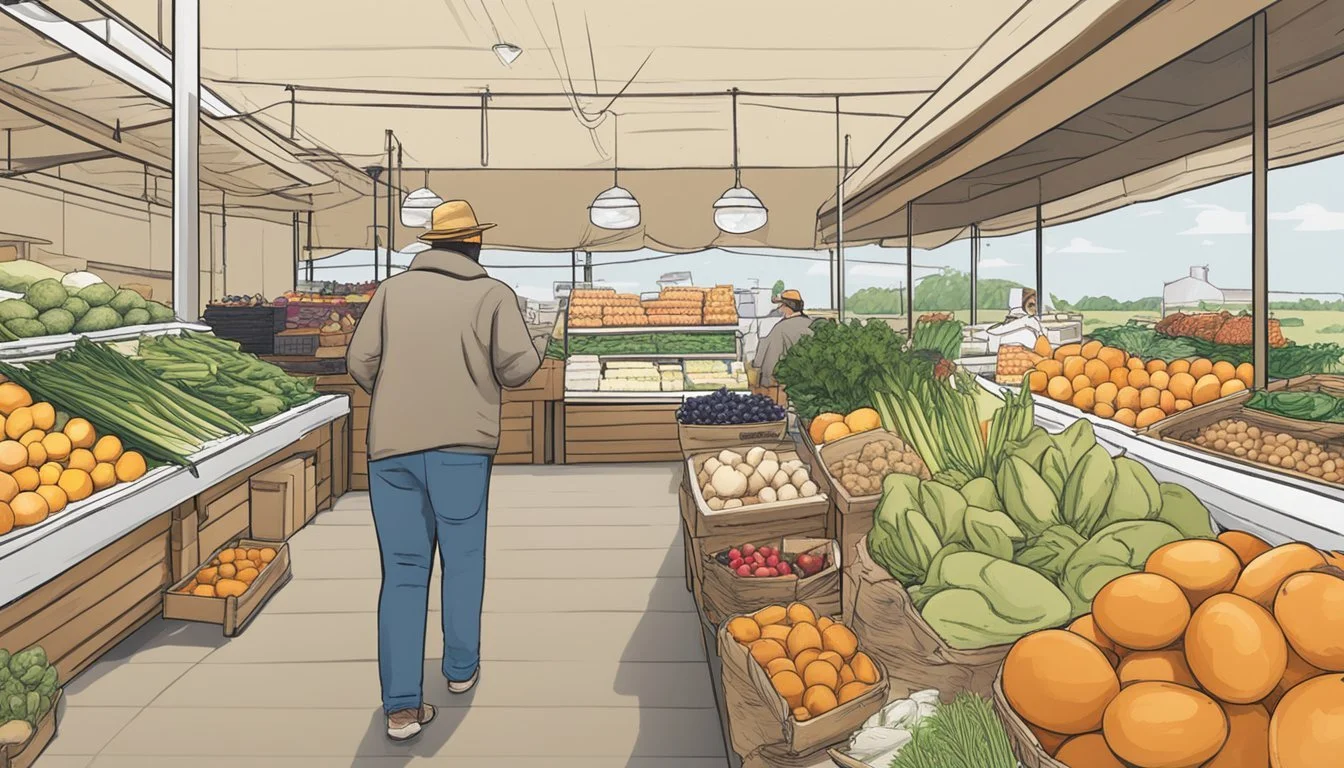Community Supported Agriculture (CSA) in Richmond, VA
Nourishing Local Food Movements
Community Supported Agriculture, commonly known as CSA, represents a growing movement in the Richmond, Virginia area that connects the community with local farms. The concept of CSA is grounded in the principle of mutual benefit between local farmers and community members. By purchasing a share of the anticipated harvest, consumers essentially become stakeholders in the farm's seasonal production. This model not only fosters a deeper understanding of agriculture but also ensures that residents have access to fresh, locally-sourced produce.
Richmond's agricultural scene is vibrant, with various farms offering CSA programs that cater to the interest in sustainable and seasonal eating. These programs allow residents to experience the rhythms of agricultural life, embracing both the periods of abundance and scarcity inherent in farm production. CSAs in the region have adapted over time with diverse models, reflecting the needs and preferences of both the producers and the consumers.
Among the notable CSA initiatives in Richmond, one finds farms like Sophia's Pantry in Dinwiddie and Agriberry Farm that have been trailblazers in this field. They provide an array of seasonal vegetables, fruits, and crafted goods that exemplify the bounties of Virginia’s harvest. Each CSA program offers distinct formats and timeframes to accommodate the varying needs of the community, ensuring that a partnership with local farms is both accessible and rewarding.
Understanding CSA
Community Supported Agriculture (CSA) represents a partnership between local Richmond farms and the community, providing a direct connection to high-quality, local produce. This collaborative effort strengthens the regional agricultural economy and promotes sustainable farming practices.
Principles of Community Supported Agriculture
The CSA model is built on a foundation of mutual support between farmers and consumers. The core principles include:
Direct Sales: Consumers purchase shares directly from farms, ensuring farmers receive fair compensation while consumers gain access to fresh produce.
Shared Risk: Members and farmers share the risks of farming, including variable harvests due to weather or pests.
Community Engagement: CSAs often involve members in the farming process through volunteer opportunities, fostering a sense of community.
Sustainability: Farming practices are designed to be sustainable, promoting environmental health.
History of CSA Movement in Virginia
The CSA concept in Virginia has evolved significantly since its introduction. Key milestones in its history include:
Early Adoption: Small family farms began offering CSA programs to diversify sales and sustain operations.
Diversity in Models: Variations developed in share offerings, such as bulk pays or seasonal shares, accommodating different community needs.
Growth: Over time, the number of CSA farms increased around Richmond, reflecting growing consumer interest in local agriculture.
Innovation: As the market evolved, so did the CSA models, adapting to consumer preferences and expanding into new areas like seasonal fruit offerings.
Benefits of Joining a CSA
Joining a Community Supported Agriculture program in Richmond, VA, offers a multitude of advantages, from the enhanced freshness of your food to the promotion of environmental sustainability. CSA members enjoy direct access to high-quality produce while underpinning the local economy and fostering eco-friendly farming practices.
Freshness and Quality of Produce
CSA members relish the unparalleled freshness of their food, as the produce is locally grown and harvested at the peak of ripeness. This level of freshness not only augments the taste and nutritional value but also extends the shelf life of the food. In Richmond, residents can experience a visible difference in the quality and flavor of their fruits and vegetables, as compared to those shipped from distant locations.
Supporting Local Farmers
When individuals join a CSA, they are directly supporting local farmers in the Richmond area. This support helps preserve small-scale farming, ensuring that farmers receive a fair price for their labor and produce. It also enables farmers to plan their crop rotations with confidence, knowing they have a dedicated customer base.
Environmental Impact
CSAs in Richmond contribute positively to the environment. Localized food systems mean fewer travel miles for produce, significantly reducing the carbon footprint tied to food transportation. Moreover, many CSA farms practice organic or sustainable farming methods, which minimize the use of pesticides and other harmful chemicals and foster biodiversity.
Economic Benefits for Richmond Area
Investing in a CSA circulates money within the Richmond community, bolstering local economics and job creation. By purchasing shares from CSAs, consumers ensure their food dollars stay local, reinforcing the economic health of the region and securing the livelihood of those who work on and own the farms.
Choosing the Right CSA in Richmond
Selecting a CSA in Richmond is essential for those seeking to engage with local agriculture and to enjoy fresh, seasonal produce. By evaluating different CSA models and considering specific needs, residents can make informed decisions and support sustainable farming practices.
Considerations for Picking a CSA
When choosing a CSA in Richmond, consumers should assess factors such as pick-up locations, variety of produce, and the duration of the CSA season. They also need to understand the level of commitment required, as most CSAs necessitate upfront payments to support farm operations.
Pick-up Locations: Confirm the convenience of CSA pick-up points.
Produce Variety: Look for a diverse selection of fruits and vegetables.
Season Duration: Determine the length of the CSA season to ensure it aligns with your needs.
Understanding Different CSA Models
CSAs can operate under various models, allowing for different levels of engagement and types of produce. The traditional model offers weekly shares of fruits and vegetables, whereas some farms may include options for eggs, meat, or even cut flowers.
Traditional Shares: Typically consist of vegetables and fruits.
Flexible Shares: May include options to select specific produce or add-on products.
List of Popular CSAs in Richmond
Richmond hosts a range of CSAs, each with unique offerings. Below are several popular options:
Agriberry Farm: Known for seasonal berries and fruit shares.
Farm to Family: Offers a wide variety of shares, including produce, meat, and dairy.
Tomten Farm: Focuses on providing a diverse selection of vegetables.
Crumptown Farm: Specializes in offering heirloom and unique vegetable varieties.
The Farm Bus: Operates a mobile market that makes stops around Richmond, providing flexibility in share pickups.
CSA Name Specialty Items Pick-up Locations Agriberry Farm Berries and Fruits Various, including Richmond Farm to Family Wide Range, Meat, Dairy Richmond area Tomten Farm Diverse Vegetables Richmond area Crumptown Farm Heirloom Vegetables Specific Richmond locations The Farm Bus Various, Mobile Market Multiple stops in Richmond
Residents should consider these options, among others, when looking for a CSA that best fits their preferences and lifestyles.
Seasonal Offerings in Richmond CSAs
In Richmond, Virginia, Community Supported Agriculture programs provide a vast array of fresh produce, meat, and dairy that reflect the region’s changing seasons. Members can enjoy the diversity and freshness of local offerings throughout the year.
What to Expect Each Season
Spring: During the spring, CSA members can anticipate a selection of tender greens and early vegetables. Items such as lettuce, spinach, and kale make their way into boxes, along with radishes and early herbs.
Summer: As the weather warms, summer brings an abundance of variety including tomatoes, peppers, berries, and cucumbers. This season is the height of Richmond's local produce, providing a colorful assortment to CSA participants.
Fall: Fall ushers in a rich harvest where squashes, apples, and root vegetables like carrots and potatoes become plentiful. The cooler weather supports the growth of a second wave of greens as well.
Winter: While the winter season can be challenging, many CSAs still offer cold-tolerant greens, stored root crops, and hearty winter squashes. Greenhouses may also provide additional variety.
Variety of Fruits and Vegetables
Richmond CSAs are proud of their diverse offerings. The region's fertile land allows for a wide selection of vegetables from leafy greens to flavorful root vegetables. As for fruits, members can enjoy everything from strawberries and peaches in the summer to apples and pears in the fall. Each season promises a rotation reflecting the local harvest at its peak.
Availability of Meat and Dairy
Apart from produce, some Richmond CSAs also offer high-quality meat and dairy products. Typically, these include:
Meat: Various cuts of beef, pork, lamb, and chicken, often pasture-raised and hormone-free.
Dairy: Fresh milk, cheese, and sometimes yogurt from local dairies.
These animal products are sourced from nearby farms where ethical practices and sustainability are the norms.
Membership and Cost
In Richmond, VA, Community Supported Agriculture (CSA) offers residents the opportunity to purchase a share of a local farm’s production, providing them with regular, fresh produce while supporting local agriculture.
Understanding CSA Shares
A CSA share is essentially a membership or subscription to a farm's seasonal production. Members receive a weekly or bi-weekly box of vegetables and, in some cases, additional farm products such as fruits and flowers. Sophia's Pantry CSA, for instance, operates two seasons of approximately 13 weeks each, supplying local, seasonal vegetables to its members.
Pricing and Payment Options
The cost of CSA shares in Richmond can vary based on the farm and the type of share. For example:
Sophia's Pantry CSA: Offers two 13-week seasons of vegetables.
Amy's Garden: Provides a 16-week season of vegetables, fruit, and flowers, priced at $34 per week.
Fertile Crescent Farm: A 20-week whole share is priced at $500 and a half share at $300, with delivery available for an additional $50.
Payment options may include full payments upfront or installment plans. Some farms, like Fertile Crescent Farm, may offer delivery for a season-long fee.
Financial Commitment and Risks
When individuals decide to become CSA members, they share in the risks of farming, such as poor harvests due to unfavorable weather or pests. However, this financial commitment helps ensure the farm's ability to operate and often allows members to form a closer relationship with the source of their food. It's important for prospective members to be aware of and comfortable with the inherent risks before joining a CSA.
Logistics of CSA Operations
CSA programs in Richmond, VA, offer various logistics options tailored for convenience and efficiency. These include farm pick-up, home delivery, and multiple distribution points within the Richmond area. Attention to the packaging and handling of goods reflects their commitment to quality and sustainability.
Farm Pick-Up and Home Delivery
Farm pick-up is available at designated times, where members can visit the farm directly to collect their shares of fresh produce. This method encourages a closer connection between consumers and growers. In contrast, home delivery services provide the ultimate convenience, delivering fresh goods directly to a member's doorstep. Availability and schedules for delivery may vary among CSA providers.
Distribution Points in Richmond Area
CSAs utilize distribution points across the Richmond area to ease access to fresh produce. These points are often strategically located in neighborhoods to minimize member travel time. Information about specific locations and times for pick-up is typically available on the CSA's website or communicated directly to members.
Packaging and Handling of Goods
Proper packaging and handling are crucial to maintain the freshness and quality of CSA products. Goods are typically harvested, sorted, and packed with care, often using eco-friendly materials. This ensures that produce arrives in optimal condition while aligning with sustainable practices. Richmond's CSAs are conscious of minimizing waste and preserving the integrity of their products throughout distribution.
Engagement with CSA Community
Community Supported Agriculture (CSA) programs in Richmond offer an array of opportunities for members to actively engage in local food systems, fostering strong relationships through events, volunteerism, and a shared commitment to sustainability.
Events and Volunteering Opportunities
Richmond's CSA scene offers a calendar of events aimed at connecting members with their food and farmers. Sophia’s Pantry CSA features seasonally organized events, providing customers with hands-on experiences from planting to harvest. Members can participate in farm visits or seasonal celebrations that highlight the abundance of local produce. Volunteering options often include assisting in the distribution of weekly CSA shares, helping to maintain farm spaces, or participating in educational workshops, all of which serve to strengthen the community bond and the individual's connection to their food source.
Developing Relationships with Local Farmers
CSA members appreciate the opportunity to develop relationships with the very people who grow their food. Agriberry Farm, a notable CSA in the region, encourages direct interaction between the farm and its community. By visiting farm stands at markets like Richmond’s Northside Farmers Market, members can meet local farmers, often resulting in lasting connections and a deeper understanding of agricultural practices. The farmers provide newsletters updating on seasonal offerings and share stories about the farm's operations, further bridging the gap between producer and consumer.
Contributing to the CSA's Sustainability
Members contribute not just financially but also by actively supporting the CSA's mission of sustainability. Through their subscriptions, such as the "bulk" pay program offered by Amy’s Garden, members provide upfront capital that supports farm operations through different seasons. This advance commitment reduces waste and ensures a stable market for the farmers' produce. Moreover, by opting into seasonal eating, CSA members acclimate to the natural growing cycles, promoting environmental stewardship and reducing the ecological footprint associated with long-distance food transportation.
Additional Products Offered by CSAs
In addition to the staples of fresh fruits and vegetables, many Community Supported Agriculture programs in Richmond, VA, offer a diverse array of additional products. These range from local specialties to organic offerings, and even include artisanal and preserved items.
Local Specialties and Artisan Goods
CSAs in Richmond often feature local specialties and artisan goods to showcase the region's culinary diversity. Members can expect to find items such as:
Local Meats: Including grass-fed beef, free-range poultry, and heritage pork.
Artisan Cheeses: From local dairies.
Berries: A variety of fresh, seasonal berries sourced from regional farms.
Organic and Non-GMO Options
Many CSA members prioritize organic and non-GMO options for their health benefits and environmental sustainability. Available products frequently include:
Organic Vegetables: A broad selection grown without synthetic pesticides or fertilizers.
Organic Eggs: From hens raised on organic feed and with outdoor access.
Organic Grains: Such as wheat, oats, and barley that are non-GMO and often heirloom varieties.
Preserves, Baked Goods, and Beverages
CSAs also provide an opportunity to enjoy preserves, baked goods, and beverages that are often handcrafted with traditional methods. Some of these include:
Jams and Honey: Small-batch preserves made from local fruit and locally harvested honey.
Baked Goods: Including bread, pies, and other pastries made with locally sourced ingredients.
Coffee and Tea: Some CSAs may offer locally roasted coffee or locally blended teas.
Pickles and Sauces: Crafted from local produce, these add flavor and variety to the CSA shares.
By offering these products, CSAs support local producers and provide members with a broader taste of the region's best, all while maintaining a commitment to quality and sustainability.
Challenges Faced by CSA Members
Navigating the complexities of diet and food preferences poses significant challenges for CSA members. These issues are magnified when considering nutritional needs and food allergies.
Addressing Food Preferences and Allergies
CSA members often have diverse dietary requirements that can include food allergies or specific nutritional needs. Ensuring that the selection of produce accommodates these preferences is essential. Farmers and organizers must be attentive to:
Food labeling for potential allergens.
Providing alternatives for commonly allergenic foods such as nuts or dairy.
Communicating with members to understand dietary restrictions.
Dealing with Overabundance or Shortages
The nature of agricultural output means that CSA members must contend with the realities of bounty and scarcity. Seasonal variations can result in a surplus of certain crops while others may be scarce. Members face the challenge of:
Utilizing an overabundance of certain items before spoilage.
Adapting recipes and meal plans when specific products are in short supply.
Preserving surplus through methods like canning or freezing to mitigate shortages later.
Conclusion
This section distills the essence of Community Supported Agriculture’s impact in Richmond and anticipates its trajectory in the local food scene.
Summarizing the Value of CSA Membership
Membership in CSA programs offers Richmond residents a means to invest directly in local agriculture, fostering a sustainable and resilient food economy. It is not just a purchase; it's a partnership with tangible benefits for both the consumer and the farmer. Members receive fresh, seasonal produce straight from their local farms, which often translates to higher nutritional value and exceptional flavor. Moreover, they are directly contributing to the stability and growth of small-scale farms within their community.
Future of CSA in Richmond
The future of CSA in Richmond looks increasingly integral to the city's food culture. Consumer awareness and preference for locally-sourced food have bolstered the CSA model, indicating continued growth and diversification. Farmers are adapting and innovating to meet these demands, enhancing CSA models to offer flexibility and variety. This evolution suggests that CSA will remain a key fixture in Richmond's agricultural landscape, ensuring that local, sustainable food remains accessible.










